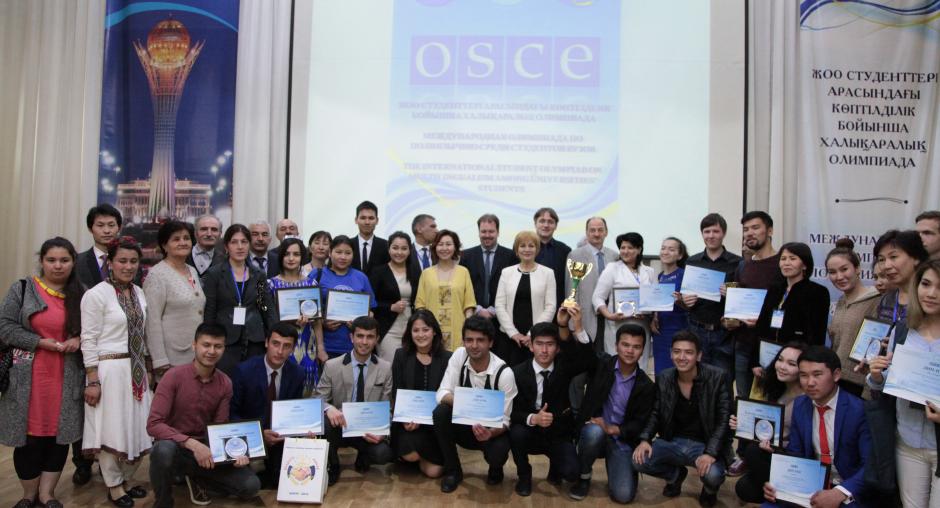First Olympiad on multilingualism in Central Asia underlines value of mother tongues, State and official, and foreign languages as tools for integration

The first Olympiad on multilingualism in Central Asia that specifically focused on the mother tongues of the region, State and official languages, as well as foreign languages was held in Karaganda, Kazakhstan from 4 to 6 May 2017.
Organized by Karaganda State University, in co-operation with the OSCE High Commissioner on National Minorities under its Central Asia Education Programme, the Olympiad attracted 102 students from 25 universities in Kazakhstan, Kyrgyzstan and Tajikistan who collectively spoke 18 languages: Arabic, Chinese, Dari, English, French, German, Kazakh, Korean, Kyrgyz, Persian, Russian, Shughni, Tajik, Tatar, Turkmen, Turkish, Uighur and Uzbek.
Didor Marodaseynov, a third-year pedagogics and linguistics student at Khorog State University in Tajikistan, was the winner of the individual competition. In addition to using his mother tongue of Shughni, which is spoken in parts of eastern Tajikistan, Marodaseynov competed in Tajik, English and Russian.
Nurgul Adamzhanova from the Pavlodar State University and Igor Sesorov from the Pavlodar State Pedagogical Institute, Kazakhstan, shared the second place in the individual competition, while Alima Buksukbaeva from L.N. Gumilyov Eurasian National University, Kazakhstan, Juldyz Gabbasova from the Eurasian Humanitarian Institute, Kazakhstan, and Araylum Tabriz from Karaganda State University, Kazakhstan, shared third place.
In the team event, Pavlodar State University took first place, L.N. Gumilyov Eurasian National University came second and Osh State University, Kyrgyzstan, placed third.
In the competitions for specific linguistic skills, Shahzoda Ortikova from Uzbekistan, a student at South Kazakhstan State University, won the “best expert in the State language” prize; Firuz Norov from the State Languages Institute, Tajikistan, who speaks Tajik, Russian, English, Chinese, Persian, Dari and Arabic, won the “best expert in the languages of Central Asia” competition; and Samandar Sheraliev from the State Pedagogical University, Tajikistan, won the “Super Polyglot” competition with his knowledge of Tajik, Kazakh, Russian, English, Kyrgyz and Uzbek. Jalal-Abad State University, Kyrgyzstan, took the “most multilingual team” award.
In the closing ceremony, Ambassador Gyorgy Szabo, Head of the OSCE Programme Office in Astana, said that by supporting multilingual education, the Olympiad would help to promote cultural diversity, security and stability within the OSCE area.
Marc Fumagalli, HCNM senior advisor, added that this event underlined the HCNM’s efforts to promote national minorities’ right to learn and use their mother tongues as a way to preserve their identity while also highlighting the role of the state language as a tool for the integration of diverse societies. Learning foreign languages demonstrates a sense of openness to the world, he concluded.
The Karaganda branches of the National Centre for Professional Development “Orleu” and the Assembly of the People of Kazakhstan also contributed to the organization of this event.
